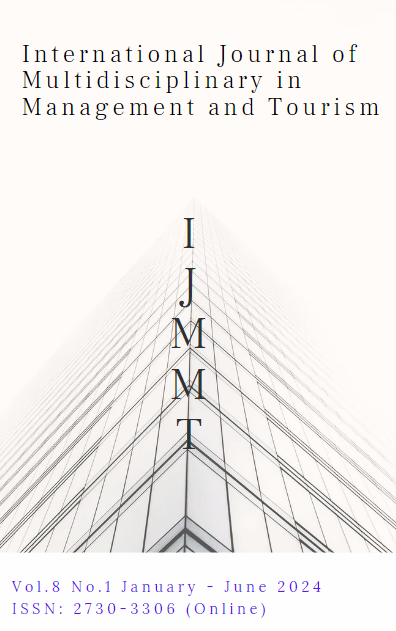Study of Artworks from the Sukhothai Period in Thailand and the Yuan and Song Periods in China to Create Visual Artworks
Main Article Content
Abstract
This study aims to demonstrate the unique artistic style of illustration and a deep understanding and appreciation of these cultures through the fusion of Buddhist art from the Sukhothai period in Thailand and ink and landscape paintings from the Yuan and Song periods in China.Buddhist art of the Sukhothai period emphasizes the solemnity and sanctity of religious beliefs through the vivid display of Buddhist elements. Meanwhile, the ink and landscape paintings of the Yuan and Song dynasties add color to the illustrations, presenting natural and emotional expressions. The fusion of these two styles represents the harmonious coexistence of multiple cultures, emphasizing the complementarity and integration between different eras and cultures. Through this fusion of cultures, the illustrations provide viewers with a profound cultural experience, inspiring them to think about history and cultural heritage.
The results of this study highlight the artistic and cultural value of Buddhist art from the Sukhothai period and ink landscape paintings from the Yuan and Song periods. This integration represents a deep understanding and appreciation of different cultural and artistic periods, blending the essence of different eras and further enriching the diversity of art.
Article Details

This work is licensed under a Creative Commons Attribution-NonCommercial-NoDerivatives 4.0 International License.
References
Blackburn, A. M. (2007). Writing Buddhist Histories from Landscape and Architecture: Sukhothai and Chiang Mai. Buddhist Studies Review, 24(2), 192-215. https://doi.org/ 10.1558/BSRV.V24I2.192
Formoso, B. (2016). Thai Buddhism as the Promoter of Spirit Cults. South East Asia Research, 24(4), 563-583. https://doi.org/10.5367/SEAR.2016.0295
Kim, K. N. (2022). A Study on the Influence of the Xi Xia in Buddhist Art of Yuan. Journal of Humanities and Social Sciences, 4(3), 256-269. https://doi.org/10.31658/dshr.34.13
Kitiarsa, P. (2010). Missionary Intent and Monastic Networks: Thai Buddhism as a Transnational Religion. Sojourn: Journal of Social Issues in Southeast Asia, 25(1), 94-122. https://doi.org/10.1355/SJ25-1E
Klunklin, A., & Greenwood, J. (2005). Buddhism, the Status of Women, and the Spread of HIV/AIDS in Thailand. Health Care for Women International, 26(8), 679-694. https://doi.org/10.1080/07399330590885777
Malikhao, P. (2017). Thai Buddhism, the Mass Media, and Culture Change in Thailand. In Culture and Communication in Thailand. Communication, Culture and Change in Asia, 3, 1-16. https://doi.org/10.1007/978-981-10-4125-9_1
Ming, Q. (2017). Chan Buddhism in Literati Culture During the Song Dynasty. DEStech Transactions on Social Science, Education and Human Science, 4(3), 134-142. https://doi.org/10.12783/DTSSEHS/MESS2017/12245
Piyabhani, P. N. (2016). Sukhothai Kingdom: The Golden Age of Buddhism. Journal of International Buddhist Studies, 7(2). Retrieved from https://so09.tci-thaijo.org/index. php/jibs/article/view/2445
Prakitnonthakan, C. (2019). The Origins of Sukhothai Art as the Thai Golden Age: The Relocation of Buddha Images, Early Ratanakosin Literature and Nationalism. South East Asia Research, 27(3), 339-355. https://doi.org/10.1080/0967828X.2019.1638668
Sawitree, W. (2013). Visualizing the Evolution of the Sukhothai Buddha. Southeast Asian Studies, 2(3), 559-582. https://doi.org/10.20495/SEAS.2.3_559
Skilling, P. (2007). For Merit and Nirvana: The Production of Art in the Bangkok Period. Arts Asiatiques, 6, 76-94. https://doi.org/10.3406/ARASI.2007. 1675
Wang, X. (2018). A Brief Discussion on the Buddhist Literature and Art of the Tang Dynasty. International Journal of Social Sciences, Education and Humanities Research, 1(7), 51-58. https://doi.org/10.2991/SSEHR-17.2018.51
Zhao, X. (2023). Yuan Dynasty Religious Art View. Art and Performance Letters, 4(4). 1-8. https://doi.org/10.23977/artpl.2023.040401

